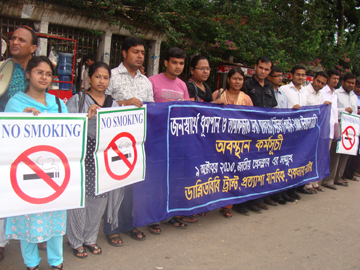
 The Government has passed Smoking and Tobacco products (Control) Law in 2005 for public interest. But tobacco companies taking the advantages of loopholes of the law are presenting ads and inspiring smoking which hinders effective implementation of the law. Law development is needed to avoid the pitfall. Speakers said while attending a demo in front of the National Press Club on 09 October 2010.
The Government has passed Smoking and Tobacco products (Control) Law in 2005 for public interest. But tobacco companies taking the advantages of loopholes of the law are presenting ads and inspiring smoking which hinders effective implementation of the law. Law development is needed to avoid the pitfall. Speakers said while attending a demo in front of the National Press Club on 09 October 2010.
General Secretary of Prattyasha Helal Ahmed said that as the law defines cigarettes as tobacco products only. As a result, necessary steps can not be adopted for other tobacco products like zarda, sada-pata, gool, Cigar, mixer used in pipes are not included as tobacco products in its definition though they are as harmful as cigarettes. The speakers demanded inclusion of the products in definition of tobacco products in the law for saving the people.
A K M Khalilullah of NATAB said that the law declares ‘public places’ and ‘public transport’ smoke-free. The non-motorized cars remain out of the jurisdiction of the law as it only covers motorized cars as public transport. Besides, workplaces, private institutions, restaurants and salons are not enlisted as public places though smoking in these places cause hazards for women and children. The speakers demanded inclusion of non-motorized vehicles along with the places under into the law. They also demand legal action against tobacco farming to save agro land and environment.
The speakers further said that tobacco companies though tobacco advertisement is banned are continuing tobacco advertisements through use of name, logo and color of the company, offering presents to the customers, presenting smoking scenes through TV and cinema, and under the guise of corporate social responsibility (CSR) to instigate the youth to smoking. So, the law is required to be developed to safeguard public health, environment, economy and the youth of the country.
The speakers demanded ban on smoking zone in public places and public transports, ban on indirect tobacco ads by tobacco companies, inserting pictorial warning on 50% spaces of tobacco packets, ban on tobacco company’s promotional initiatives in guise of CSR, ban on manufacturing of any products in packets and jars like of tobacco products, empowering individual to take legal actions against tobacco companies for law violation, increasing penalty for outlawed companies and individuals, developing policy for tobacco taxation and alternative farming, expanding scope of authorized officers and introduction of penalty for failure of creating smoke-free places and its maintenance.
The program was moderated by Sayeda Anonna Rahman, National Advocacy Officer of WBB Trust and was addressed by among others Emdadul Haq, Project Coordinator of ACLAB, S M Saikat, Executive Director of SERAC Bangladesh, Amir Hossain, President of Green-mind Society, Habibur Rahman, Director of Manab Unnayan Sangstha, K M Rafiqul Islam, Director of PSS, Masud Rana, Project officer of Manobik and Arifur Rahman Murad, Executive Director of SARDA
